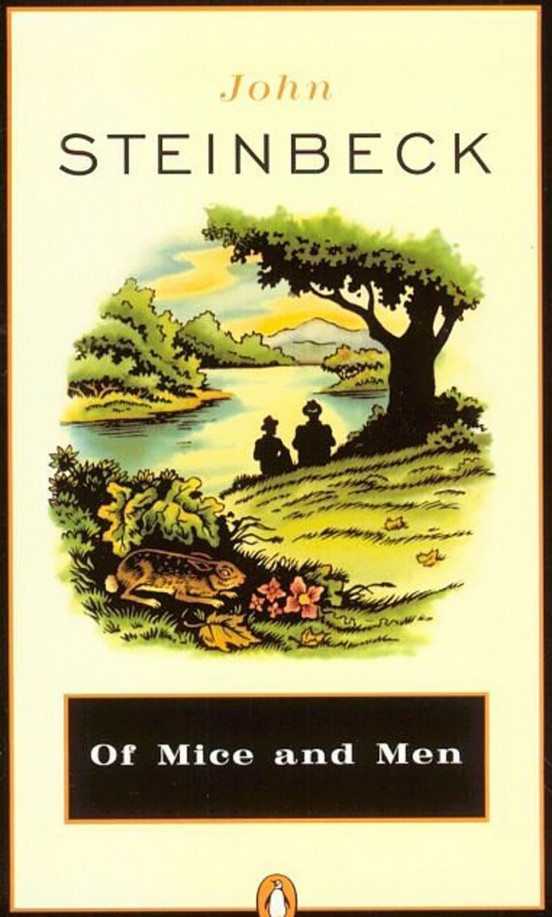6/2/16
Letter Essay #9: Of Mice and Men
I have recently finished reading Of Mice and Men by John Steinbeck. This realistic fiction book is 107 pages long, and was originally published in 1937. Steinbeck studied marine biology at Stanford University, and he had already published 5 books before writing Of Mice and Men. Steinbeck was born in 1902 in Salinas, California; and he died in New York in 1968. Steinbeck won the Pulitzer Prize and National Book Award in 1940. But it did not stop there, he also won the Nobel Prize in 1962. Like his characters, Steinbeck grew up working at ranches near his home, before graduating, top of his class, and attending Stanford. After writing numerous books that did not go far, Steinbeck wrote Tortilla Flat in 1935. This book took his career in a positive turn, so he continued to pursue writing. Then, in 1937, Steinbeck wrote Of Mice and Men. He got his ideas and characters from real life people, Lennie was a fellow laborer of Steinbeck’s, and they worked alongside each other for weeks. An did you know that Of Mice and Men was not the original name of the book? It was actually originally called Something That Happened. I chose to read this book because it is a popular classic, and after looking through Mr. Jocker’s library and finding this book, I knew that I wanted to read it before the end of the school year. For the 40 book challenge, I was able to complete reading 35 books including this book. I was hoping to achieve my goal of 40 books, but I am very proud of being able to read 35 books this school year.
George always has to take care of Lennie, ever since the were young kids. George is a small, quick, smart, and a hard worker. While Lennie is big, and can’t really think for himself. George and Lennie want to own a small little farm, with fruit trees and rabbits and cows. But they can never seem to have enough money to buy the land, and to make money they need to work. But whenever they try to find work, something bad always ends up happening and the need to run from that place as fast as they can. So George brings Lennie to a new ranch, where they hope to make enough money as soon as they can so they can buy their own property. But after the incident at the first ranch (when Lennie just wanted to feel a woman’s dress, but was accused of rape) George just tells him to keep his mouth shut and work hard. Lennie right off the bat is seen as a hard worker, when he can buck barley twice as fast as his partner. But when Curley (the ranch owners son) gets in a fight with Lennie, he doesn’t know what to do. He just stands and takes it. But before long, George is yelling at him to fight back. But again, Lennie just stands against the wall taking the beating and just pleading for him to stop. Finally, Lennie grabs Curley’s hand before he can throw another punch. This just leads to Lennie’s big paw of a hand breaking almost every bone in his hand. So all the men protect Lennie, telling Curley that something bad will happen if he tells and gets them fired. But if Lennie could so effortly break a bone in a man’s entire hand, what else could he “accomplish?” By accident, or on purpose?
I was surprised at how George handled the situation when Curley was beating Lennie up. I understand that George wants Lennie to be more independent, and be able to fight for himself, but Lennie is like a child. He just sits there and just pleads for the attacker to stop. And then George just keeps telling him to fight back, which just ends up making things worse. Lennie has no idea what type of strength he truly has, and how so effortlessly he could hurt someone. I like the way the author keeps scenes in the book “short and sweet.” I find that this helps keep the book moving, and reader paying attention, without the book lagging or dragging. The main characters, George and Lennie, have quite an interesting relationship; how George is always helping Lennie and reminding him of things that he may have forgotten. But on the other hand George tries to get Lennie to be more independent, stand up for himself, and really think before he does something. In this scene, George and Lennie are about to head up to the new ranch that they are planning on working on, but Lennie keeps forgetting things and George is getting frustrated. George just doesn’t want to get fired, or have another incident like what happened in Weed.
“O.K.,” said George. “An’ you ain’t gonna do no bad things like you done in Weed, neither.”
Lennie looked puzzled. “Like I done in Weed?”
“Oh, so ya forgot that too, did ya? Well, I ain’t gonna remind ya, fear ya do it again.”
A light of understanding broke on Lennie’s face.
“They run us outa Weed,” he exploded triumphantly.
“Run us out, hell,” said George disgustedly. “We run. They was lookin’ for us, but they didn’t catch us.”
Lennie giggled happily. “I didn’t forget that, you bet” (Pg. 7).
I really like this quote because I find that it really shows George and Lennie’s relationship, and the daily conversations that occur between the two of them. It really shows how George almost has to be a father to Lennie, keeping him out of trouble, teaching him right from wrong, holding on to his money for him, daily care and planning, etc. I would rate this book an 8 out of 10.
Sincerely,
Margaret Brady

